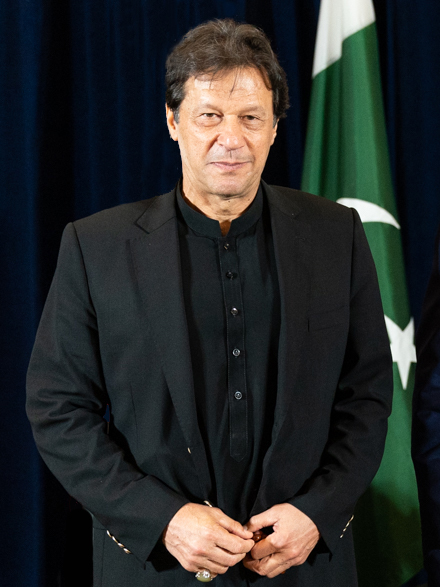
The Fall of Khan: How Pakistan’s Former Prime Minister Sealed His Own Fate
Now faced with the full bureaucratic wrath of Pakistan’s military establishment, nearly 150 court cases, a deluge of party defections, and his own narcissism, populist former Prime Minister Imran Khan has steered himself and his party into the abyss. Since taking the reins of power in 2018, the Pakistan Tehreek-e-Insaf Party (PTI) was the preeminent civilian force in Pakistani politics but the recent reversal of tides has been so swift that even Khan’s critics have voiced surprise. The military establishment, which has been the main power-broker in Pakistan during the majority of its 75-year existence, now seems to have dusted off nearly every measure of repression and coercion in its playbook to destroy Imran Khan as a political entity.
After his removal from office via a vote of no-confidence in April 2022, attempts were made to muzzle the outspoken Khan by censoring any coverage of him across domestic media. Those outlets that defied the censorship campaign by providing a platform to Khan and his party were forced off-air. Despite this, the famous-cricketer-turned-politician was able to draw ever larger rallies to lambast the current government and invigorate his populist message. As his momentum grew, so did his willingness to confront the military establishment head-on.
The size of the rallies and Khan’s increasingly bullish posture has led the security establishment and the civilian government to the conclusion that Khan’s populist influence will not diminish without prosecuting him and his associates. Furthermore, Pakistan’s senior leadership - both civilian and military - seem determined to keep Khan from returning to power. The recent charge of murder for the killing of lawyer Abdul Razzaq Shar (who had filed charges of treason against the former Prime Minister) is perhaps the most serious of the accusations that could get him disqualified from public office ahead of elections. Khan has, unsurprisingly, called the accusation “foolish”. But with Pakistan’s highest courts pushing back against the current government and the military’s leverage weakened by public fury, this strategy of legal disqualification is less likely to succeed. That is unless Khan is taken to military courts where he lacks partisan allies to protect him.
In the pending case of Abdul Razzaq Shar’s killing, the lawyer was traveling to the Balochistan High Court complex on June 6th when he was shot by unknown gunmen, according to a criminal complaint. Shar had filed a petition last month with the Balochistan High Court, seeking action against the former prime minister under Article 6 of Pakistan’s Constitution, charging him with high treason. Khan would not be the first prime minister to be put on trial by military courts, nor has he been the first populist leader to turn against the military establishment after it helped usher them into power. He may follow the path of former Prime Minister Zulfikar Ali Bhutto - the recent charges of murder are reminiscent of those leveled against Bhutto - who was hanged in April 1979 only on charges of attempted murder.
Back on the political stage, the comparative lack of fortitude among allies and mid-level party members who have abandoned the PTI has been staggering relative to other parties who have faced similar repressive measures by the military. The scale of the exodus has led some to speculate Imran Khan’s lack of ideological focus and his party’s overreliance on a cult of personality has left those under fire with little reason to persist with the party in the face of severe personal consequences.
Former PTI leaders who are trying to rebuild the party without Khan have acknowledged to the Guardian that “Anyone who has known him closely, knows he just thinks about himself. Khan is a big narcissist.” In this vein, Imran Khan’s explosive and emotional reaction to his removal from office suggests that his ego was severely wounded by the event. His semi-conspiratorial rhetoric at rallies and in interviews further the notion that his thinking and decision-making have become more pathological as his feelings of personal injustice and insecurity grow.
The rising stakes of the political confrontation between Khan and his former benefactors can be squarely attributed to the rash choices he made both during his tenure and after. While none of the last five prime ministers before Khan had been allowed to serve their full 5-year term and had all been indicted or imprisoned after leaving office, Khan has been the only one to take it so personally and direct his ire at the military establishment and its senior leadership. Last September, observers of the intensifying political situation commented on the dangerous course of Khan’s remarks - criticisms of the military which he has only redoubled in the months since.
His dramatic arrest on May 9th from the premises of the Islamabad High Court by paramilitary forces in riot gear was almost certainly in response to Khan’s claim just the day before that the chief of the country's intelligence agency, Major General Naseer of the Inter-Services Intelligence (ISI), had been behind an assassination attempt against him back in December. Such a blunt accusation - even if fully substantiated - was a reckless move. As former Pakistani Senator Mustafa Nawaz Khokhar explains, “naming [members of the military establishment ]directly offends them and invites consequences.”
Additionally, during his time in office, Imran Khan made adversaries of both the former and current Chief’s of the Army (widely considered to be the most powerful position in Pakistan). Khan decided to meddle in (then Army Chief) Major General Bajwa’s appointment of General Munir to the post of ISI Chief, and ultimately dismissed him from the position after only 8 months. Fast-forward to November 2022, Major General Munir was selected as the next Chief of the Army. It is hard to know exactly the extent of personal animosity that Munir holds for Khan, but it does not currently appear as though the army is in a forgiving mood. Whatever restraint existed before has come loose in the wake of May 9th’s violent riots and vandalism of military monuments and infrastructure - protests which were sparked by Khan’s abrupt (and later deemed illegal) arrest that day. The unprecedented attacks on symbols of military sacrifice and power have been referred to as a “black day in the history of Pakistan” by General Munir, and it has given the army a pretext to try 16 PTI members in military courts under the controversial doctrine of necessity.
“This dramatic crackdown is a clear strategy by the military to break down all the support structures that Khan has,” said Avinash Paliwal, an associate professor in international relations at Soas University of London. “Once those structures are gone, Khan is next in line” predicted Professor Paliwal, and the 16 civilians currently facing military trials may be intended as a precedent for bringing Khan before those same courts.
The PTI wants elections as soon as possible, while the government has pushed for elections no earlier than October - this being the latest date that the government can constitutionally hold such elections. Although it is more than likely that Khan would be disqualified from participating in these elections his ultimate fate is in the hands of Major General Munir. Had he played the long game like the preceding political dynasties, rather than biting the hand which fed him power, it is more than likely that his party would not have been subject to such unprecedented erasure by the military establishment.
